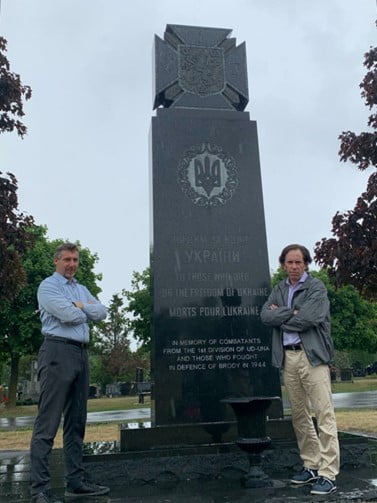
March 11, 2024
OAKVILLE, Ont. – B’nai Brith’s advocacy has successfully led to the removal from a Canadian cemetery of a monument honouring Ukrainians who fought for the Nazis during World War II.
The cenotaph was completed in 1988 to commemorate veterans of the 14th Waffen Division of the Nazi SS. The unit was made up of Ukrainian collaborators who swore allegiance to Adolf Hitler and, according to historians, participated in atrocities against civilians.
From its creation, the monument served as a painful reminder that, even as Jewish refugees were denied entry into Canada, the Government allowed hundreds if not thousands of Nazis and their accomplices to settle in this country. Over the years, the monument also became a frequent destination for neo-Nazis seeking to pay homage to the Third Reich.
“The Jewish community is relieved that the monument, which paid homage to the legacy of the SS, is no longer present in this Canadian cemetery,” said Richard Robertson, B’nai Brith Canada’s Director of Research and Advocacy. “Under our CEO, Michael Mostyn, we have been calling for the removal of this hateful symbol for many years. We are thankful that the Ukrainian custodians of the site have finally decided to take this important step.”
The removal of the monument comes several months after a former member of the Nazi regiment, Yaroslav Hunka, was honoured in the Parliament of Canada, generating global outrage and renewed interest in Nazi immigration to this country following the end of the Second World War. Its existence underscored the importance of B’nai Brith’s long-running campaign for the Government to declassify all Holocaust-related archival materials, including the full and unredacted final report of the 1985-1986 Deschênes Commission.
Officially known as the “Commission of Inquiry on War Criminals in Canada,” this was the only formal Government study on the subject. David Matas, B’nai Brith Canada’s Senior Legal Counsel, represented our organization at the Commission and has been pushing to publicize its findings ever since. The results have remained under seal apart from the recent publication of previously redacted portions of Dr. Alti Rodal’s initial 1986 report on the Commission’s findings.
“Removing the monument should serve as an impetus for further action,” Robertson said. “We must review Canada’s present immigration framework. Our policies continue to allow war criminals and those whose values and morals are not aligned with that of our nation to live on Canadian soil, including individuals associated with the Iranian Revolutionary Guard Corps (IRGC). This is an unacceptable reality that cannot continue. We must learn from our past.”


